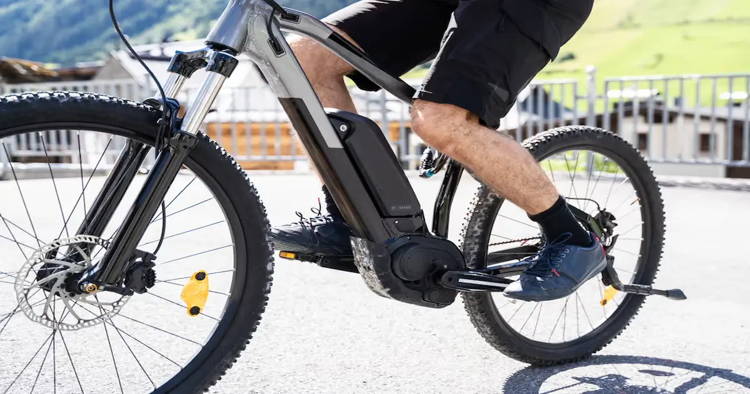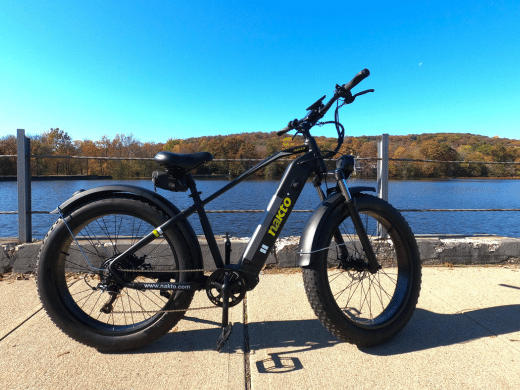Are you curious about electric bikes and their weight? You’re not alone.
The weight of an electric bike can influence your riding experience, your ability to transport it, and even your purchasing decision. But why is this such an important factor? Imagine effortlessly gliding through city streets or conquering steep hills with ease.
The weight of your electric bike plays a pivotal role in this seamless experience. It affects everything from speed to battery life. By the end of this article, you’ll have a clear understanding of how much does an electric bike weigh typically and why does it matter for your daily adventures. Get ready to discover the perfect balance between performance and convenience.
Table of Contents
Factors Affecting Electric Bike Weight
Electric bikes, or e-bikes, come in various sizes and types. The weight of an e-bike can influence its performance and usability. Understanding the factors that affect an e-bike’s weight can help you make informed decisions. Here are some key elements that determine the weight of an electric bike.
1. Battery Size and Type
The battery is a crucial component of an e-bike. Larger batteries tend to weigh more, but they also offer longer riding ranges. Lithium-ion batteries are commonly used, and they are lighter than other types. Battery weight can significantly add to the bike’s total weight.
2. Motor Size
Motors add power to e-bikes. Larger motors generally weigh more. They provide more power and speed. Smaller motors are lighter but may offer less power. Motor weight is a key factor in overall bike weight.
3. Frame Material
The frame material plays a big role in weight. Aluminum frames are light and durable. Steel frames are heavier but more robust. Carbon fiber frames are the lightest. Each material has its pros and cons, and your choice affects the bike’s weight.
4. Additional Features
E-bikes can have various features, including lights, fenders, and racks. More features mean more weight, so consider which features are necessary for you. Each extra adds to the total weight.
5. Tire Size and Type
Tire size affects both weight and ride quality. Larger tires are heavier and provide better stability. Thinner tires are lighter and suitable for speed. Choose tires based on your riding needs. Tire choice impacts the bike’s weight.
6. Component Quality
High-quality components often weigh less and can be more expensive. Cheaper components may weigh more and might affect performance. Consider quality when choosing an e-bike. Quality impacts both weight and durability.

Credit: fucarebike.com
Weight Of Different Electric Bike Types
Electric bikes come in various shapes and sizes, each tailored to specific needs and preferences. The weight of an electric bike can significantly impact your riding experience, influencing factors such as speed, maneuverability, and ease of storage. Understanding the weight differences among various types of electric bikes can help you choose the one that best fits your lifestyle. Let’s explore the details of the weight of different electric bike types.
Folding Electric Bikes
Folding electric bikes are designed for convenience and portability. They typically weigh 35 to 50 pounds. Their lightweight design makes them easy to carry onto public transport or store in tight spaces. If you live in a city apartment or commute using a train, a folding electric bike might be your best friend. Imagine seamlessly transitioning from a bike to a train journey without sweat.
Mountain Electric Bikes
Mountain electric bikes are built to tackle rough terrain. They usually weigh around 50 to 70 pounds. The sturdy frame and added suspension for shock absorption contribute to the extra weight. If you love adventurous trails, you might appreciate the robust construction that ensures safety and stability. But can you handle the extra heft when scaling hills or transporting the bike?
Commuter Electric Bikes
Commuter electric bikes strike a balance between weight and functionality. They weigh approximately 40 to 60 pounds. Designed for everyday use, they offer a comfortable ride without sacrificing speed or efficiency. Picture yourself breezing through morning traffic, arriving at work refreshed rather than drained. Would you prefer a smoother ride with some extra weight for stability?
Cargo Electric Bikes
Cargo electric bikes are the heavyweights in the electric bike family, tipping the scales at 60 to 80 pounds or more. They are designed to carry heavy loads, making them ideal for grocery runs or transporting goods. With their robust build, they can handle the weight of additional passengers or packages. Can you see yourself using a cargo bike for practical errands, or prefer a lighter ride?
Choosing the right electric bike weight depends on your personal needs and lifestyle. Consider what matters most to you—portability, ruggedness, daily use, or cargo capacity—and let that guide your decision. What type of electric bike fits your world?
Components Influencing Weight
Electric bike weight varies due to motor size, battery capacity, and frame material. Lightweight frames reduce the weight, while larger batteries and motors add heft. Electric bikes weigh between 40 and 70 pounds, influencing ease of transport and handling.
Understanding the weight of an electric bike is crucial, especially if you’re considering it for daily commuting, leisure rides, or fitness goals. Various components contribute to the weight of an e-bike, and knowing these can help you make an informed decision. Let’s explore the key elements influencing how much an electric bike weighs.
Battery Size And Type
The battery is the powerhouse of your e-bike, but it can also be one of the heaviest parts. Larger batteries provide more range but add significant weight. Lithium-ion batteries are common due to their lighter nature compared to lead-acid batteries.
Consider how far you’ll typically ride. Is the extra range worth the added weight? Balancing battery size and weight can be crucial for your riding experience.
Motor Specifications
The motor is another essential component affecting weight. Hub motors are generally lighter and simpler, while mid-drive motors offer better performance at the cost of more weight.
A heavier, more powerful motor might be beneficial if you live in a hilly area. But remember, it can add pounds to your bike, impacting maneuverability.
Frame Material
The frame material plays a significant role in the overall weight. Aluminum frames are lightweight and affordable, while carbon fiber is lighter but more expensive. Steel frames, though durable, tend to be the heaviest.
Think about your budget and the terrain you’ll be riding on. Do you prioritize a lightweight frame for easy transport, or are you okay with a sturdier, heavier option?
Additional Accessories
Accessories can sneakily add weight to your e-bike. While useful, items like racks, fenders, and lights can contribute to the overall heft.
Evaluate what accessories you truly need. Are they worth the extra weight if they enhance your biking experience? Sometimes, less is more when it comes to maintaining a lighter ride.
Eventually, knowing the components that influence the weight of an electric bike helps you choose the right one for your lifestyle. Consider how these factors align with your needs and preferences. Are you ready to find the perfect balance between weight and performance for your ideal ride?

Credit: upway.co
Average Weight Ranges
Electric bikes are becoming a popular choice for commuters and outdoor enthusiasts alike. One common question is, “How much does an electric bike weigh?” Understanding the average weight ranges can help you choose the right e-bike for your lifestyle. Whether you’re looking for something lightweight for city riding or a heavy-duty model for rugged trails, knowing the weight can make a big difference in your riding experience.
Lightweight Models
Lightweight electric bikes typically weigh between 30 and 50 pounds. These models are perfect for urban commuters who need a bike that’s easy to carry upstairs or onto public transit. A friend who lives in a fifth-floor apartment swears by his lightweight e-bike. He enjoys the convenience of riding to work without the hassle of lugging a heavy bike up the stairs daily.
Standard Models
Standard electric bikes usually weigh 50 to 70 pounds and offer a balanced mix of performance and comfort. This weight category is ideal if you’re planning to use your e-bike for leisurely rides around town or weekend adventures. Imagine a Saturday trip to the farmers market, cruising comfortably with a basket full of fresh produce, all on a standard e-bike.
Heavy-duty Models
Heavy-duty electric bikes can weigh 70 pounds or more. These robust models are built for durability and tackling challenging terrain. If you love off-road biking or need a bike that can handle extra weight for long trips, a heavy-duty e-bike is your go-to option. Picture yourself conquering a rugged trail with ease, knowing your bike can effortlessly handle the bumps and dips.
Choosing the right e-bike weight isn’t just about the numbers. It’s about how it fits into your daily routine and adventure plans. What type of e-bike weight suits your lifestyle best?
Weight Considerations For Riders
Electric bike weight matters for riders. It affects performance, portability, and handling. Different bikes have different weights, depending on their materials and features. Riders need to think about weight before buying. A heavier bike can be tough for some.
Lighter bikes offer more ease but may lack power. Understanding weight implications helps in making the right choice. Let’s explore the impact on performance, portability, and handling.
Impact On Performance
Weight influences an electric bike’s speed and battery life. Heavier bikes may drain the battery faster. This can limit travel distance. Lighter bikes often accelerate quickly. Riders may find them easier to control on steep climbs.
A bike’s weight can also impact its stability. Some riders prefer heavier bikes for a stable ride, while others enjoy the agility of lighter models. Choose based on your riding style and needs.
Portability And Storage
Storing and transporting an electric bike can be challenging. A heavy bike might be hard to lift into a car and may require more space at home, while lighter bikes are easier to carry and store.
Consider where you’ll store the bike and how often you’ll transport it. A foldable, lightweight bike might be ideal for city dwellers. Space and convenience are key factors in weight considerations.
Ease Of Handling
Handling is crucial for safety and comfort. A lighter electric bike is easier to maneuver, which is important in crowded or narrow areas. Riders can easily navigate through traffic.
Heavy bikes might feel cumbersome for some. They can be harder to balance at low speeds. Consider your strength and fitness level. Ensure you can handle the bike safely. The right weight will make your ride enjoyable.
Comparing Electric And Traditional Bikes
Due to batteries and motors, electric bikes usually weigh more than traditional bikes, typically between 40 and 70 pounds. Traditional bikes are generally lighter, often weighing around 20 to 35 pounds.
When you’re in the market for a new bike, whether electric or traditional, weight is a crucial factor to consider. A bike’s weight affects how it feels when you ride, how you store it, and how easily you can transport it. Understanding these differences is essential to making the right choice for your lifestyle and needs. Let’s discuss how electric and traditional bikes compare in terms of weight.
Weight Differences
Electric bikes are generally heavier than traditional bikes. This is primarily due to the battery and motor adding extra pounds.
A typical electric bike can weigh anywhere from 45 to 80 pounds, while a standard traditional bike usually weighs between 20 and 30 pounds.
Imagine lifting an electric bike onto a car rack compared to a traditional bike; the difference is significant and something you should plan for.
Performance Implications
Weight affects a bike’s performance. An electric bike’s motor compensates for its added weight, providing a smoother ride uphill and on flat surfaces.
However, if the battery runs out, pedaling an electric bike without assistance can be more challenging than a lighter traditional bike.
Consider your usual biking routes—are they mostly uphill or flat, or do you need to carry your bike up stairs? This can help determine which type best suits your needs.
Choosing between an electric and a traditional bike isn’t just about weight, but how that weight affects your riding experience. What kind of ride are you looking for?
Choosing The Right Weight For Your Needs
Selecting the right electric bike weight is crucial for comfort and efficiency. Typically, electric bikes weigh between 40 and 70 pounds. Consider your riding needs and terrain to find the perfect balance for your journey.
When choosing an electric bike, the weight can significantly impact your overall experience. Whether commuting through the city or embarking on long scenic rides, the bike’s weight can make or break your journey. Let’s explore how to choose the right weight for your specific needs.
Personal Riding Preferences
Your riding style is a crucial factor. A heavier bike might provide more stability and comfort if you prefer leisurely rides. On the other hand, if you enjoy zipping through traffic or tackling challenging terrains, a lighter bike offers more agility.
Consider your physical strength. A lighter bike is easier to lift and maneuver, especially if you carry it up stairs or load it into a vehicle. Think about how much effort you’re willing to exert regularly.
Lastly, reflect on your past experiences. Did a particular bike feel cumbersome or just right? Your intuition might guide you better than any specification.
Specific Use Cases
Different activities demand different bike weights. For city commuting, a mid-weight bike balances speed and comfort. It’s not too heavy to carry into your office but sturdy enough for daily use.
A lightweight bike is your best companion if you’re an adventure seeker planning to tackle rugged trails. It allows for quicker navigation around obstacles and makes uphill climbs less daunting.
A slightly heavier bike can offer a more challenging workout for fitness enthusiasts. It provides resistance that can help build endurance and strength over time.
Ultimately, choosing the right weight involves understanding how the bike will fit into your lifestyle. What kind of rides will you mostly do? How important is portability to you? Answering these questions will give you the perfect electric bike weight for your needs.

Credit: nakto.com
Frequently Asked Questions
What Is The Average Weight Of Electric Bikes?
Electric bikes typically weigh between 40 and 70 pounds, but their weight varies based on design, materials, and added features. Lightweight models are available for easier handling and transport. Choosing a bike with lighter components can improve performance and ease of use.
How Does Battery Size Affect Bike Weight?
A larger battery adds more weight to an electric bike. Batteries can weigh several pounds, impacting overall bike weight. Opting for a smaller, efficient battery can reduce weight. However, balancing battery size and range is crucial for optimal performance.
Are Lighter Electric Bikes Less Durable?
Not necessarily. Lightweight electric bikes use advanced materials like aluminum or carbon fiber. These materials offer durability without adding extra weight. Proper maintenance ensures longevity regardless of weight. Choose bikes from reputable brands for quality assurance.
Do Folding Electric Bikes Weigh Less?
Yes, folding electric bikes often weigh less. They are designed for portability and compact storage. Typically, they weigh between 30 and 50 pounds. Their lightweight design makes them ideal for commuters and travelers.
Conclusion
Choosing an electric bike involves considering its weight. This affects handling and ease of use. Lighter bikes are easier to lift and store, while heavier models may offer better stability and features. Think about your needs and terrain. City riders might prefer lightweight options.
A sturdier bike could be best for trails. Always test ride before buying. Feel the difference in weight and comfort. Remember, the right balance enhances your biking experience. Explore options and find a bike that fits you. Happy riding!

